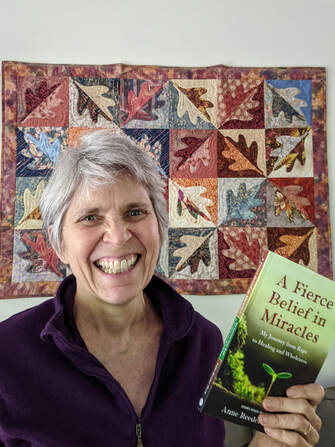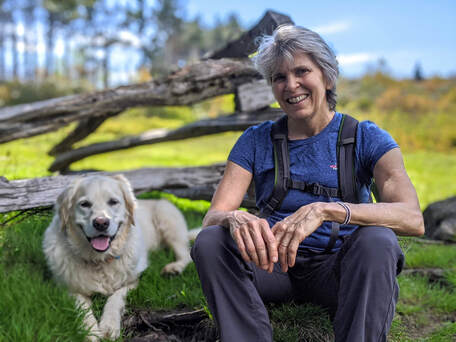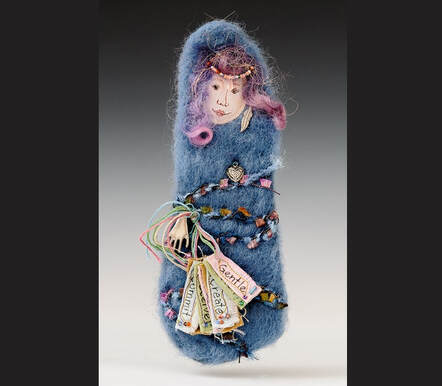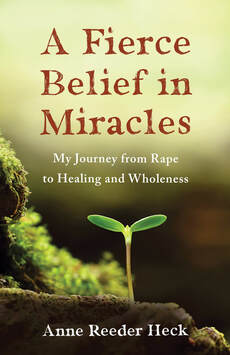Interview with
Anne Reeder Heck
Rape Survivor & Author of A Fierce Belief in Miracles
Anne Reeder Heck
Rape Survivor & Author of A Fierce Belief in Miracles
|
Anne Reeder Heck is an author, speaker, healer, artist, rape survivor and victims advocate. Her new memoir offers both guidance and solace for those seeking healing, those ready to explore paths of forgiveness and spirituality. A Fierce Belief in Miracles: My Journey from Rape to Healing and Wholeness is a powerful and uplifting memoir of determination and trust. It’s for anyone who believes in - or questions - the existence of miracles.
Anne inspires and guides others to trust themselves, to be open to their intuitive guidance and to experience the magic of life through ceremony, positive intention and a creative, curious spirit. Through speaking, mentoring and workshop facilitation, she inspires women to connect with their personal power, leading to greater self-confidence, deeper awareness, stronger boundaries and a willingness to speak their truth. Anne devoted five years to founding and facilitating assertiveness and self-defense trainings throughout Western North Carolina. Anne is also a graduate of IMPACT and DC Model Mugging as well as a graduate of Feminine Power Training with Claire Zammit and Katherine Woodward Thomas. She completed training as a Child Protection Advocate with Kidpower, an international nonprofit devoted to keeping kids safe. |
For over twenty years, Anne served as a volunteer advocate for Our Voice (Asheville's Rape Crisis Center) and has served six years on the Our Voice Board of Directors. She speaks openly about her rape with intent to instill hope in others. Anne facilitates circles of women and offers individual mentoring. She is a Healing Touch Practitioner and has been trained and/or has participated in over seventy different healing modalities.
Anne currently lives in the beautiful Blue Ridge Mountains of North Carolina with her husband of twenty-six years and her sweet retriever pup. She can often be found exploring the trails in Pisgah Forest with her dog or meditatively turning her pedals on the Blue Ridge Parkway.
Anne currently lives in the beautiful Blue Ridge Mountains of North Carolina with her husband of twenty-six years and her sweet retriever pup. She can often be found exploring the trails in Pisgah Forest with her dog or meditatively turning her pedals on the Blue Ridge Parkway.
Myrna Haskell, executive editor, asked Anne to answer a few questions about the healing process and how she became an advocate for other women experiencing the journey toward healing.
When did you know you had turned a corner with your state of mind after the rape?
Healing, for me, held many transformational moments. One of the first major turning points resulted from a dream I had two years after the incident. In the dream, I was the rapist and the rapist became me. When I awoke, I understood that we had something in common: we shared our woundedness. Knowing this helped me find forgiveness for myself and for him, and I began a process of inner reflection and deeper self-understanding.
Who/what had the most influence on your healing?
I had the good fortune of sitting with a Cherokee medicine man weekly for six years. His guidance during a time when I was seeking emotional ballast was invaluable in helping me find my center and anchor myself there. Subsequently, my connection with and trust in the spiritual realm profoundly shifted my perception of what effects change on a healing path. I also participated in a healing doll journey for seven years. This introspective process of creative expression provided deep and lasting emotional healing.
When did you know you had turned a corner with your state of mind after the rape?
Healing, for me, held many transformational moments. One of the first major turning points resulted from a dream I had two years after the incident. In the dream, I was the rapist and the rapist became me. When I awoke, I understood that we had something in common: we shared our woundedness. Knowing this helped me find forgiveness for myself and for him, and I began a process of inner reflection and deeper self-understanding.
Who/what had the most influence on your healing?
I had the good fortune of sitting with a Cherokee medicine man weekly for six years. His guidance during a time when I was seeking emotional ballast was invaluable in helping me find my center and anchor myself there. Subsequently, my connection with and trust in the spiritual realm profoundly shifted my perception of what effects change on a healing path. I also participated in a healing doll journey for seven years. This introspective process of creative expression provided deep and lasting emotional healing.
|
How did becoming an advocate for other women help you on your journey?
Being an advocate for women through our local rape crisis center as well as through facilitating women’s circle offered me opportunities to hear others’ stories and questions. This helped me better understand myself and develop more self-compassion. Did the writing process itself help you heal? Writing my book required me to dig deep emotionally, and the repeated reading and editing of my words re-traumatized me. This required me to make self-care my priority. Throughout my writing and editing, I worked intensely with a breath work coach and with a somatic experiencing practitioner in order to connect with the places in my body that still held trauma. Greater awareness always equates with healing. |
Anne Lounging and at Peace with her Dog
Photo Courtesy: Anne Reeder Heck |
|
Inner Healer with Medicine Bundle
Photo Courtesy: Anne Reeder Heck [Anne created a series of healing dolls over a span of seven years. The dolls represent the healing of trauma that stemmed from her experience of being violently raped at the age of twenty-six. More about the use of doll making as a catalyst toward healing can be found in Anne's book.]
|
What drew you to doll making?
I’ve always loved tiny things. When journaling no longer seemed effective in processing my emotions, I sought ways to express in three dimensions. I was attracted to dolls because they clearly communicated emotion through their body postures and facial expressions. I was also intrigued that doll making has been used throughout history as a way of doing deep healing work. The process of creating an image to represent my own emotion was immensely powerful, and communicating with the dolls through journaling offered invaluable insights to support my healing. "This doll is the Inner Healer - a wisdom keeper. She celebrates the end of a transformational process and symbolizes lessons learned, which are represented in her medicine bundle. The inner healer is the culmination of a spiritual quest for meaning and embodies the many gifts we carry that support us on a healing path. For me, she’s a reminder of the power to move through a healing process with gentleness and self-compassion." ~ Anne Reeder Heck |
What piece of advice would you give another woman who is afraid to tell her story or for someone who blames herself for the trauma?
Having volunteered as a victim’s advocate at our local rape crisis center for over twenty years, I’ve witnessed varied approaches to sharing personal story. Speaking truth can be a very emotional process, and it’s important for a woman to decide for herself when and if that’s something she feels ready to do. If it’s a matter of sharing with law enforcement after the crime, I feel it’s important to consider both what you need for yourself and what you want for the safety of the larger community. If you choose to work with law enforcement, establish a network of friends or advocates to support you. If you choose not to pursue it, be compassionate with yourself about that decision and open yourself to healing opportunities available to you.
The victim of assault is not to blame; self-blame, however, often becomes a natural coping defense. It’s important for survivors to surround themselves with people who love and support them and who accept them where they are in their healing process.
Having volunteered as a victim’s advocate at our local rape crisis center for over twenty years, I’ve witnessed varied approaches to sharing personal story. Speaking truth can be a very emotional process, and it’s important for a woman to decide for herself when and if that’s something she feels ready to do. If it’s a matter of sharing with law enforcement after the crime, I feel it’s important to consider both what you need for yourself and what you want for the safety of the larger community. If you choose to work with law enforcement, establish a network of friends or advocates to support you. If you choose not to pursue it, be compassionate with yourself about that decision and open yourself to healing opportunities available to you.
The victim of assault is not to blame; self-blame, however, often becomes a natural coping defense. It’s important for survivors to surround themselves with people who love and support them and who accept them where they are in their healing process.






